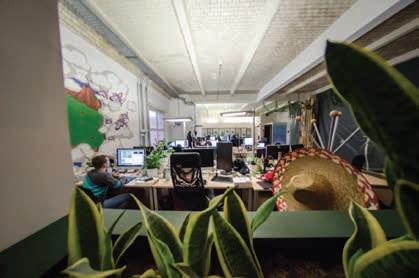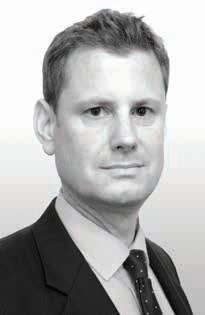
5 minute read
Are you in the club?
horizons — join the club! Broaden flexible working
CONAL O’HARA — himself COO of a London club — argues in favour of dens offering more than just prestige
Advertisement
THERE is a new style of flexible working space entering the market: business clubs.
The narrative is shifting from tech start-ups and the gig economy as more mature businesses are looking to embrace flexibility whilst maintaining confidentiality, discretion and the gravitas of an established city postcode.
Totaljobs recently found that 84 percent of employees would consider turning down a job offer that didn’t offer flexible working. Employees with a sense of ownership over their working day are likely to be more engaged and more motivated.
Businesses recognise this, and are starting to view flexibility as a business opportunity that can
Professionals can choose a suitable workspace
increase productivity and attract and retain talent.
Professionals can choose a suitable workspace, with access to lounges, meeting rooms and “hot-desks” at various locations. Spaces near transport hubs mean workers on the move can drop into any location between meetings, cutting travel time.
Clubs also provide IT support, in-house office maintenance and concierge services.
Breakout areas and business lounges let employees select an environment likely to produce optimum results.
In increasingly competitive markets, offices can be leveraged in the war for talent. Flexible working and desirable environments are key elements of a job offer.
That research by Totaljobs shows 75 percent of employers believe flexible working boosts retention rates. While employees still require traditional incentives, they increasingly look to workplaces for inspiration and motivation.
Networking gets a boost,
as workers rub shoulders with other members, and the strategic benefits are appealing.
Considering short- and medium-term growth plans, businesses can avoid overcommitting to office space. A shorter 12- or 36-month agreement, supported by turn-key solutions and dropin locations, can offer a good alternative, allowing businesses to scale up or down with changing circumstances.
Space is more than just a room these days. It’s about a collection of services, as well as four walls, providing support.

A place where workers can hang out... and make deals, perhaps?
The gravitas of an established City postcode



Tenth time lucky for solar funding leads to multiple plants and stock exchange listing

10
Wandee Kunchornyakong PEOPLE

WANDEE Kunchornyakong is living proof that it’s never too late to capitalise on a business opportunity.
Kunchornyakong was lured out of retirement in 2008 by new legislation from the Thai government seeking to promote the country’s renewable energy sector. She began to research the potential, and learned that Thailand boasts some of the strongest solar-radiation levels of the region.
“With the same investment for setting up a solar-power plant, a solar farm in Thailand will have more energy output, perhaps double to triple capacity of those in developed countries,” she told The Bangkok Post. “I knew the possibility of success was high and the risk for failure was very low.” She went to banks, detailed business plan in hand, to seek financing for her first solar power plant. Despite Kunchornyakong’s fool-proof proposal, she met rejection — and ageism. She was in her early 50s at the time.
“The more I was rejected and discredited because of my age, the greater feeling I had that I must make it happen,” she recalls.
At the tenth bank she approached — Kasikornbank — she managed to catch the attention of the manager. She suggested that the bank, which broadcast its environmental priorities with a green logo, should change the logo colour if they were to deny her application. The bold move secured a meeting — and an offer to finance 60 percent of the $20m project.
Kunchornyakong raised the missing capital by reaching out to friends and family and by selling her and her husband’s home and land. When she applied for the permits for the plant, she was granted not one, but 36. She was the first, and only, applicant. Kunchornyakong had little difficulty in locating a blended finance package from the World Bank’s International Finance Corporation and the Clean Technology Fund. The solar energy conglomerate she founded — SPCG PCL — now includes the 36-plant network in Thailand and more than 40 subsidiaries, including solar-farm and solar-roof businesses. Listed on Thailand’s Stock Exchange (BKK: SPCG), the company has announced new joint ventures in the pipeline and predicts revenue growth to exceed 15 percent in 2020.
Patrick Collison
10


PEOPLE WHEN Patrick Collison took his first computer course at Limerick University as an eight-year-old, he was off to a head start.
He continued his precocious progress by learning computer programming two years later, and by the time he was 16, Collison had won BT Young Scientist of the Year for creating his own programming language, Croma. He then attended Massachusetts Institute of Technology for a while but dropped out and returned to Limerick.
Enterprise Ireland, the state development agency, denied Patrick and his brother John funding for a start-up project, which led them to relocate to Silicon Valley in California.
There they teamed up with Kulveer and Harjeet Taggar, cousins and Oxford graduates, to found Auctomatic, a free service helping businesses manage selling on online sites such as eBay. The brothers sold Auctomatic for $5m on Good Friday 2008 — making Patrick a millionaire five months short of his 20th birthday.
The company was soon acquired by a Canadian company, Live Current Media. Patrick Collison was appointed director of engineering, but his entrepreneurial drive proved too strong.
By 2010 he was back with John to found Stripe, a software firm that allows individuals and businesses to make and receive payments over the internet. The business took off so quickly that by the end of 2014 the business had received a $3.5bn valuation.
Around a decade later, Stripe is valued at $35bn — catapulting the Collison lads into top spot as Ireland's wealthiest entrepreneurs. They have an estimated personal net worth of $4.2bn — each.
Collison is an avid reader, and on his website advises would-be entrepreneurs to read — a lot. Other pearls of wisdom he imparts: your prime years are those between 10 to 20 (!) and that it is best to “go deep on things, become an expert”. If you're over 20 and have missed the boat... well, too bad.
Hindsight is always 20/20, but we here at BV can't help thinking that this is one time that Enterprise Ireland must be kicking itself for missing out on this chance.










